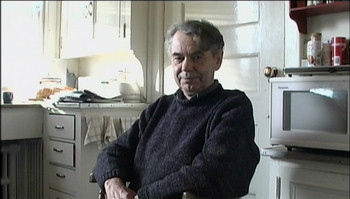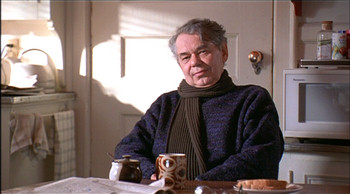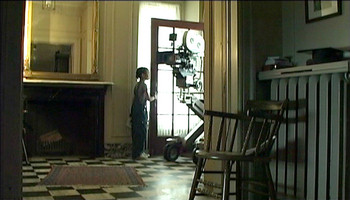Camera
 Like most of his movies, David Cronenberg’s Camera is a sly piece of work. On the surface, it’s an illustration of the effects of lighting, camera movement, recording format, performance, and even costumes.
Like most of his movies, David Cronenberg’s Camera is a sly piece of work. On the surface, it’s an illustration of the effects of lighting, camera movement, recording format, performance, and even costumes.
Camera appears to be Cronenberg’s most warm and human work. But it packs a lot into its running time, and, on closer inspection, it’s a downer about submission to addiction.
The six-minute short movie (created in 2000 in honor of the 25th anniversary of the Toronto International Film Festival) riffs on reminiscence, aging, death, youthful creativity and curiosity, film itself, technological advancement, anxiety, the gulf between the aged and the young, and acting. Its obvious point is made by bookending the movie with nearly identical shots.
The framing is virtually the same; the dialogue only varies by one word.
In the opening shot, you see an old man (Leslie Carlson), composed but displeased, complaining: “One day the children brought home an old camera. I don’t know where they got it.”
 In the closing shot, you see a wise elder (Leslie Carlson), beaming: “One day the children brought home an old camera. I don’t know where they found it.”
In the closing shot, you see a wise elder (Leslie Carlson), beaming: “One day the children brought home an old camera. I don’t know where they found it.”
The first shot is recorded on a hand-held digital video camera, in natural light, and it’s a harsh medium. The operator aggressively zooms in to emphasize the man’s age – particularly the bags under his eyes. He is an actor who doesn’t get many roles these days, and he explains his objection to the camera: “If you look at it in a cold light, photography is death. It’s all about death. Memory and desire, aging and death. … When you record the moment, you record the death of the moment. … Children and death are a bad combination.”
He relates a dream in which a movie he was watching aged him rapidly, and this is the only place in Camera that Cronenberg’s classic obsessions are plainly visible: “I had caught some kind of disease from the movie,” the man says, “and it was making me grow old, bringing me closer and closer to death. The dream has come true.”
But he says that he couldn’t tell the children what he really thought: “Take that damn camera out of the house. It will poison us all. It will do irreparable damage to us all.”
 Instead, he lets them play with it, and as his monologue continues, we see children preparing the machines, moving equipment, grooming the man’s eyebrows, applying makeup to his face … .
Instead, he lets them play with it, and as his monologue continues, we see children preparing the machines, moving equipment, grooming the man’s eyebrows, applying makeup to his face … .
“After all, the children were having fun,” he says, seemingly resigned. “And it seemed pure and innocent, as far as these things can ever be pure or innocent.”
He becomes quiet as the children take their places in the kitchen. Film begins to roll. A kid says, quietly, “Action.”
The closing shot, on film, is bathed in warm light, and the man is now wearing a scarf. His expression is a chuckle.
Cronenberg clearly wants the audience to notice how they perceive the opening and closing shots, and to understand how the technical elements of the movie-making affect our response to them.
But that could be accomplished much more easily and dramatically by presenting one immediately after the other.
Instead, he separates the two shots, and in the space between he places a context and content with which his straightforward meta-film conceit must be considered. The effect of the closing isn’t just soft light washing away the man’s anxiety in the more forgiving medium of film; it’s also the character – an actor in real life, and an actor in this movie – deliberately controlling his facial muscles, his inflection, and his tone of voice, all of which is underscored by his discussion about his profession. And his apparent tenderness is placed in stark contrast to his actual state of mind – agitated and afraid.
A casual viewing of Camera will suggest that the actor is merely indulging the kids: “After all, the children were having fun … .”
But that’s a flimsy excuse, clearly at odds with the depth of his hatred for the camera: “It will poison us all. It will do irreparable damage to us all.”
So why would he allow the camera, which he thinks will suck the life right out of him, into his house? And why is he in front of two cameras: the one the children brought home, and the one – which he addresses directly – recording his monologue?
He is an actor for whom roles have become rare. But he’s still an actor. He must act. He needs the camera. He needs it so badly that he’s willing to die for it.
He gives in to it, and he’s briefly but noticeably revived, and – for the duration of the shot – happy.
He is, in other words, a self-aware addict, knowing but not caring that these cameras could kill him. He must have the rush, the buzz, the high. He did catch a disease from the movies … .
Or, maybe, he doesn’t mean a word he’s saying. He is, after all, an actor, and his job is to make believe – or make the audience believe.
(For those irritated by the sound and video quality of YouTube, Camera is available on the Criterion Collection DVD of Videodrome.)
(This essay is a contribution to the Short-Film Week blog-a-thon.)


I watched this last month, as the extra on Videodrome, and I’d like to thank you for this interpretation. I hadn’t put much thought into it and this revisit makes me appreciate it much more.
Thanks, you Snob.